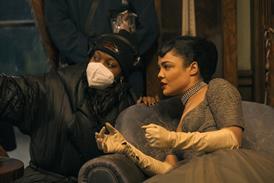Dir: Robert Lepage. Canada. 2000. 93 min. Prod co: The East Side Film Company, In Extremis Images. Int'l sales: Alliance Atlantis International, tel: (1) 310 899 8000. Prod: Sandra Cunningham, Bruno Jobin. Scr: John Mighton, from his play. DoP: Jonathan Freeman. Ed: Susan Shipton. Prod des: Francois Seguin. Main cast: Tom McCamus, Tilda Swinton, Sean McCann, Rick Miller.
Possible Worlds is so serious, so much a left-brain film - the promotional material describes it as a cubist love story - that it will require acres of thoughtful reviews to generate even a modest box office return. There are no faults in the film - the acting is perfectly suited to the action - but there's no emotion to satisfy the right-brain movie goers and thus little chance of cross-over success.
The film opens with a bizarre murder investigation: the only thing missing from the well-to-do victim's home is his brain. The detection trail leads to a brain specialist whose dark agenda is gradually teased out through the course of the story. But that's only in one world.
Based on the philosophical postulation that each of us populates a universe of possible worlds, the film imagines one man who experiences each world simultaneously, at varying levels of consciousness. This man is George Barber (McCamus) who falls in love with Joyce (Swinton), or rather Joyces. Swinton does well inhabiting the same soul in different trappings - in one world she's a shy neurologist, in the next a go-getting business woman -- while McCamus is as enigmatic as a person in George's situation would be. When one of the Joyces complains that her man doesn't seem to be 'here', she doesn't know how right she is. He's always elsewhere.
Lepage moves freely through these various worlds with George as the less than reliable navigator, returning for grounding to the missing-brain world and its few moments of levity: the doughnut munching police are ill-equipped to cope with the mental challenge. The pity is, that in all these possible worlds, Lepage doesn't tap the rich comic possibilities of George and his Joyces.
- News
- Reviews
- Features
- Festivals
- Box Office
 ‘Avatar: Fire And Ash’ hits $760m at global box office after strong hold; Italy’s ‘Buen Camino’ delivers Christmas smash
‘Avatar: Fire And Ash’ hits $760m at global box office after strong hold; Italy’s ‘Buen Camino’ delivers Christmas smash UK-Ireland box office preview: ‘The Housemaid’, ‘The SpongeBob Movie: Search For SquarePants’ lead festive releases
UK-Ireland box office preview: ‘The Housemaid’, ‘The SpongeBob Movie: Search For SquarePants’ lead festive releases ‘Avatar: Fire And Ash’ heats up UK-Ireland box office with £9m opening
‘Avatar: Fire And Ash’ heats up UK-Ireland box office with £9m opening
- Awards
 In Conversation: ‘Wicked: For Good’ director Jon M Chu and star Cynthia Erivo on favourite memories, ‘The Wizard Of Oz’ obsessions and homemade soup
In Conversation: ‘Wicked: For Good’ director Jon M Chu and star Cynthia Erivo on favourite memories, ‘The Wizard Of Oz’ obsessions and homemade soup Bafta flashback: ‘Man On Wire’ duo James Marsh and Simon Chinn on beating Danny Boyle and becoming Oscar favourites
Bafta flashback: ‘Man On Wire’ duo James Marsh and Simon Chinn on beating Danny Boyle and becoming Oscar favourites Nia DaCosta on her gender-flipped adaptation of an Ibsen classic: “Making Hedda mixed-race added layers to her torture”
Nia DaCosta on her gender-flipped adaptation of an Ibsen classic: “Making Hedda mixed-race added layers to her torture”
- Subscribe

Subscribe to Screen International
- Monthly print editions
- Awards season weeklies
- Stars of Tomorrow and exclusive supplements
- Over 16 years of archived content
- Global production












No comments yet